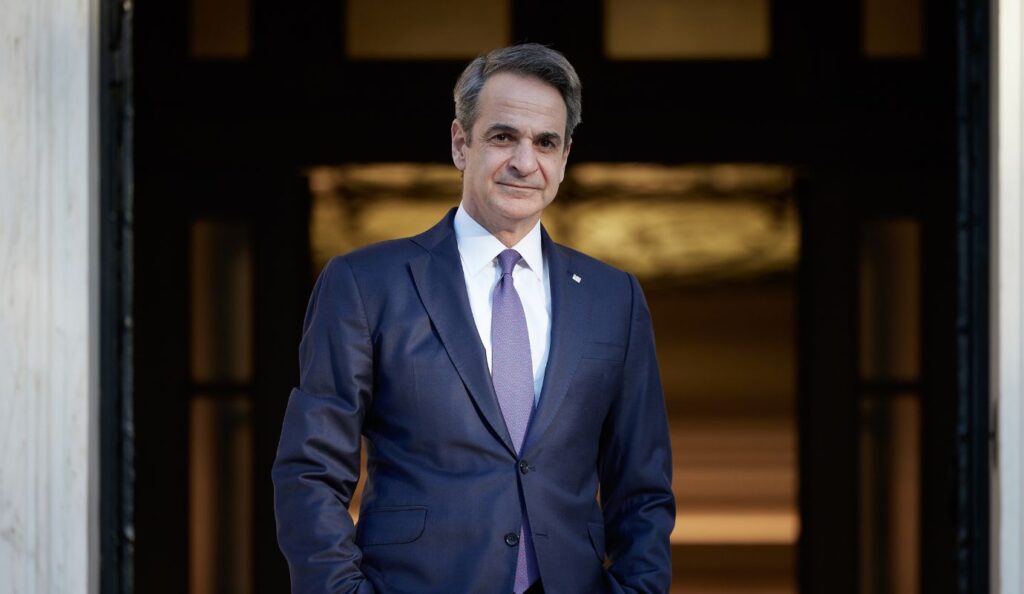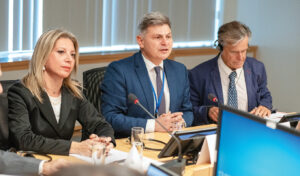In his traditional weekly Facebook post, Prime Minister Kyriakos Mitsotakis focused on government initiatives concerning youth. Notable was the reference to the Kids Wallet app, which the government is proposing to the European Commission as a foundation for establishing a unified European digital age verification threshold. Additionally, the Prime Minister discussed the new National Strategy aimed at preventing violence and addressing juvenile delinquency.
Another significant initiative is the establishment of the first Vocational High School within the Larissa Detention Center, aimed at the reintegration of young inmates.
He also referred to the “AEGIS” program for strengthening the Fire Service, as well as the operation of the new Health helpline 1566, which aims to improve citizen services in health matters.
Full post by Kyriakos Mitsotakis:
Good morning! We’re in mid-July and the heart of summer, with temperatures soaring, but work doesn’t stop, as you’ll see today.
I’ll start with an issue that concerns us intensely. For some time now, we’ve highlighted the problem of digital addiction and the dangers the internet poses to minors. KidsWallet, the Greek app we created that allows parents to regulate the applications and websites their children use, became the foundation for a proposal we made at the European level: to establish a unified digital age verification threshold below which explicit parental consent would be required for children’s access to websites and social media. Our proposal was adopted by META, and thus, in cooperation with the European Commission, a pilot age verification system for minor users is beginning in Greece, Denmark, Spain, France, and Italy. It’s a digital filter, modeled on KidsWallet, that prevents children’s exposure to inappropriate content without revealing personal data like names or exact ages. This is a significant step toward a safer digital world for our children, respecting their privacy, and I’m pleased that Greece is leading this effort.
This issue deeply concerns me not only as Prime Minister but as a parent. At the UN General Assembly last September, I spoke about this digital asymmetry – the tremendous possibilities of technology but also the great dangers of digital addiction, especially for children. My office worked extensively to raise our national concerns at the European level, and our proposals were supported by 13 countries. But we didn’t stop there: we integrated protection of minors from digital addiction into our National Strategy for Violence Prevention and Combating Juvenile Delinquency for the period 2025-2030. We still have much to do, and this challenge requires coordinated action. Governments, European institutions, technology companies, parents, along with our children, must continue this dialogue, building a digital world where we can express ourselves creatively, expand our opportunities for communication and connection, and gain access to people, information, and places previously inaccessible.
Our effort to protect and support our children naturally extends to other critical areas. Another provision of the National Strategy for Violence Prevention and Combating Juvenile Delinquency is “Cultural Actions for a more friendly Justice system.” This is an innovative social action aimed at reintegrating minors with mild delinquency through participation in specially designed cultural activities across the country. Juvenile offenders aged 12 and above will have the opportunity to participate in groups in three-month educational programs lasting at least two hours per week in museums, monuments, and archaeological sites. The program is implemented with participation from organizations supervised by the Ministry of Culture and bodies like the Hellenic Cinema Center, Audiovisual Media and Creation, the State Theater of Northern Greece, the Piraeus Municipal Theater, and the regional theaters of Crete and Ioannina, under the supervision of experienced Ministry of Culture staff and mental health specialists. This is a substantial intervention, a reform step that instead of exclusion, punishment, and stigma, offers these children the possibility of a fresh start through knowledge, participation, and creativity. An intervention that’s worthwhile, even if we manage to help just one child find their way.
This same spirit serves the establishment of the first Vocational High School within the Larissa Correctional Facility, which now gives inmates access to quality and organized vocational education. Until today, graduates of the 2nd Second Chance School of Larissa, which has operated in the correctional facility since 2004, didn’t have the opportunity to continue their studies in secondary education. There were occasional fragmented solutions that didn’t lead to acquiring recognized qualifications or open the path for meaningful change. The establishment of the 8th EPAL fills this gap. With a regular curriculum, organized learning, and officially recognized degrees, it offers a “social passport” for the next day after serving their sentence. The effort was started in 2015 by the then Director of the 2nd Second Chance School of Larissa, Giorgos Trantas, now Director of Educational Units of the correctional facility. With the law we passed in 2020 for establishing such structures, his vision now becomes reality. Education is a fundamental human right and no one can or should be excluded.
Speaking of vocational schools, I want to highlight the apprenticeship institution, an educational “pathway” that functions as a continuation of studies for graduates, combining theoretical education with paid work in companies, subsidized by the state. We place great emphasis on this institution, both through Ministry of Education programs and DYPA schools. The advantage of this pathway is that young people acquire professional rights and technical skills in high-demand sectors, leading to rapid absorption by the job market and good wages. The increased participation in recent years confirms this: within two years, the number of apprentices nearly doubled – from 3,899 and 470 departments in 2022-2023 to 6,955 and 802 departments in 2024-2025. Simultaneously, the market has embraced the institution, as 63.2% of hirings are made by private companies. As tangible recognition of this educational choice’s importance, we’re increasing the apprenticeship budget by 57.1 million euros, now reaching 182.1 million euros for the current programming period.
Investment in our youth continues at all education levels. In universities, we substantially strengthen research activity with the integration of new projects totaling 328.8 million euros through the Recovery Fund and ESPA 2021-2027. All projects to be implemented operate in three critical areas: producing applied knowledge through university-business partnerships, enhancing extroversion through international postgraduate collaborations, and procuring modern research equipment for upgrading university infrastructure.
I’ll close the education section with a significant intervention affecting students’ daily lives. Recently, the contract was signed for renovating the student residence of the Athens University of Economics and Business on Patision 279-281. A historic building with 278-bed capacity operating since 1964 is essentially being reborn with 25 million euro projects aimed at energy upgrading, static reinforcement, and creating accessible spaces and modern infrastructure. The project will be implemented by the Superfund with national resources and aims to be completed by 2030.
I move to public health and another service aimed at better citizen service. Since Tuesday, the 1566 telephone line has been operating, which any citizen can call completely free to get information on health issues, benefits, appointments, emergency services, and other NHS services. With the 1566 operation, almost 100 different telephone lines that operated fragmentarily until today are abolished. Now citizens don’t need to wonder where to turn. One number, one line, all answers. And an important clarification: 1566 doesn’t replace 166. For all emergency cases, we continue calling 166, the EKAV number.
I come to the “economy section” and specifically strategic investments, where significant progress is recorded. In recent months, 15 new investment projects totaling over 2.4 billion euros have been approved. Of these projects, 7 concern industry, 6 tourism, and 2 research and technology. Investments that bring jobs, know-how, and high value-added production. Notable, however, is our country’s dynamic entry into the European infrastructure network built around microchips and semiconductors, the most critical sector of the new digital age and economy. Our goal is, together with the gallium production investment in Greece, which is the basic raw material for semiconductor manufacturing, to create a domestic high value-added and technological chain that will contribute to Greece’s and Europe’s productive autonomy. Therefore, the strategic partnership between the Ministry of Development and the Hellenic Emerging Technologies Association (HETiA) regarding the establishment of the first Greek Semiconductor Capabilities Center with state support of 3.6 million euros is very important.
Wednesday was an important day for Monemvasia, our country, and our culture, as the inauguration and handover to citizens of Yannis Ritsos’s house, our great poet’s residence, which will function as a museum, took place. It will thus constitute a living space of memory, knowledge, and inspiration. Congratulations are due to the Municipality, Region, and Ministry of Culture who cooperated exemplarily for space restoration and creating a modern, interactive museum worthy of Ritsos’s memory and work.
Let me now turn to the very important “AEGIS” program being implemented with speed and effectiveness, strengthening our country’s civil protection system with new means and infrastructure. The day before yesterday, through the program, we received 164 modern fire vehicles of various types, including all-terrain water carriers equipped with 12,000-liter water tanks with great firefighting capabilities. Within 2025, another 132 vehicles are expected to be delivered and by the end of 2026, an additional 331. In total, the Fire Service will be strengthened with over 1,400 vehicles, financed by the Recovery Fund, ESPA, and the European Investment Bank. This is our duty: to equip the State with what it needs to respond. To stand by the frontline people, firefighters, volunteers, Civil Protection workers.
Regarding the above and reaching the end of the review, I’d like to make another appeal to property and plot owners to take care of their cleaning, first of all for their own protection. We’re still in the heart of summer. Dozens of small and large fires break out daily and we all need to contribute to preventing their spread, helping the titanic work of our firefighters and volunteers. The testimonies of the firefighters themselves are decisive: where plot cleaning has been done, fire containment and protection of private property and the natural environment is exponentially greater than cases where cleaning hasn’t been done. So far, 1,160 inspections have been conducted following complaints and in 10% of cases, fines were imposed. The issue obviously isn’t to punish violators but for all of us to do what we must to protect lives, property, and the natural environment.
We end today’s review here – 2 more Sundays remain and then a brief “break” for vacation will follow. I draw your attention to the coming days, as our experts warn that a heatwave is coming. Have a good day!




